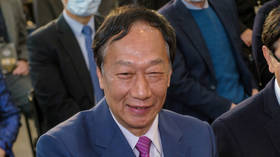Taiwanese election could tilt in Beijing’s favor

Taiwan’s leading opposition parties have agreed to combine forces with a joint ticket in January’s presidential election, consolidating their political support and boosting their chances of forming a more China-friendly government in Taipei.
The Kuomintang (KMT) and Taiwan People’s Party (TPP) formed their new alliance on Wednesday, agreeing to settle on a single presidential candidate rather than splitting the vote. They also agreed to form a joint government if they win the election.
“This is a historic moment for Taiwan, where two parties talk to form a coalition government,” TPP candidate Ko Wen-je said. “We need everyone to work together to work toward a final result.” The parties will put forward either Ko or the KMT’s Hou Yu-ih as the presidential candidate on their combined ticket after analyzing polling data together. The runner-up would become the vice presidential running mate.
Taiwan’s current vice president, Lai Ching-te of the ruling Democrat Progressive Party (DPP), is polling as the leading candidate in the presidential race. He hopes to succeed incumbent Tsai Ing-wen, who is wrapping up her second term as president and can’t seek re-election. However, combining the opposition votes puts the DPP in greater jeopardy of losing power, which would likely mean a less antagonistic approach toward China in Taipei.
“A successful opposition alliance – no matter who is running as president – means it’s likely cross-strait tensions will improve, as the opposition has more than a 50% chance of beating the DPP’s Lai according to local polls,” National Taiwan University political science professor Wang Yeh-lih told Bloomberg News. “For China, either Ko or Hou taking the presidential seat will be better than Lai.”
Beijing’s relations with the breakaway province have soured since Tsai first took office in 2016. The acrimony has increased in recent years, with the mainland government vowing to reunify with Taipei, by force if necessary, and conducting large-scale military drills in the Taiwan Strait. Tsai has hosted visits by US politicians and ramped up weapons purchases from Washington.
The KMT and TPP have both vowed to pursue talks with Beijing to “restore peace and stability in the Taiwan Strait.” Chinese officials have condemned the DPP’s Lai as a separatist and “troublemaker through and through.”
Wednesday’s agreement between the opposition parties was brokered by former Taiwanese President Ma Ying-jeou. The DPP accused the rival parties of being manipulated by the Chinese Communist Party (CCP) and knuckling under to “the will of Beijing.”
The latest poll by Taiwanese broadcaster TVBS pegged Lai’s support at 33%, followed by Ko at 24% and Hou with 22%. The billionaire founder of Foxconn, Terry Gou, announced his candidacy as an independent in August. He had only 8% support in the TVBS poll.
Gou, who failed to win the KMT’s nomination, has hinted at an alliance with Ko. Taiwanese National Security Council chief Wellington Koo told reporters on Tuesday that a Chinese tax investigation of Foxconn was politically motivated because CCP officials didn’t want Gou to split the pro-Beijing vote.













